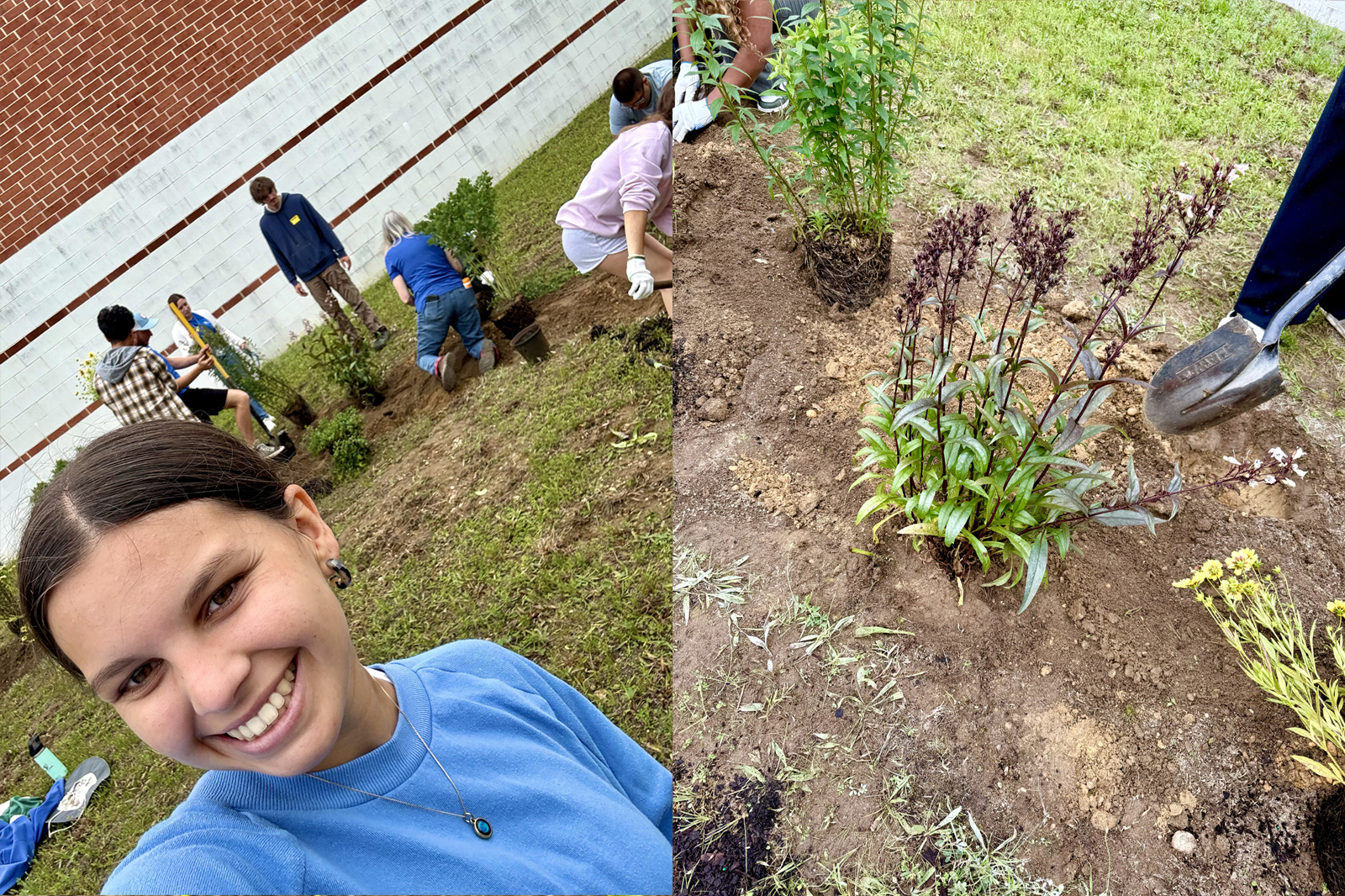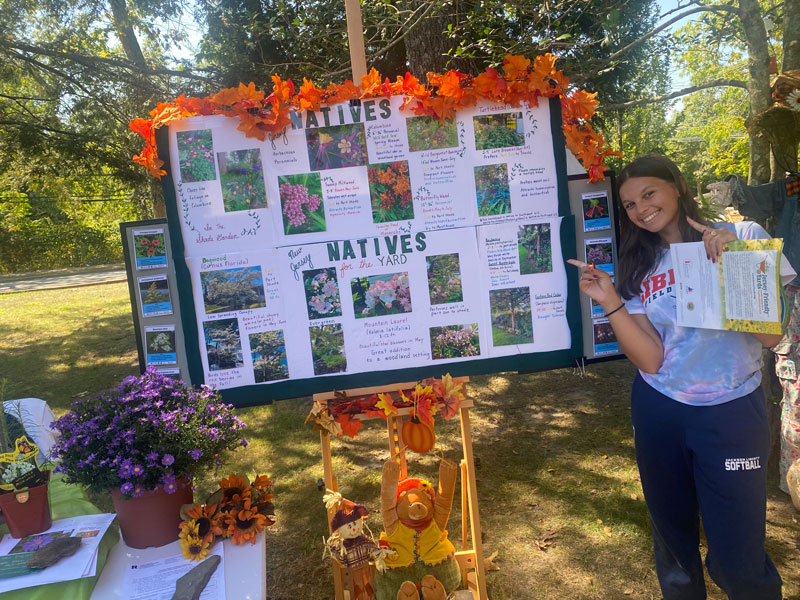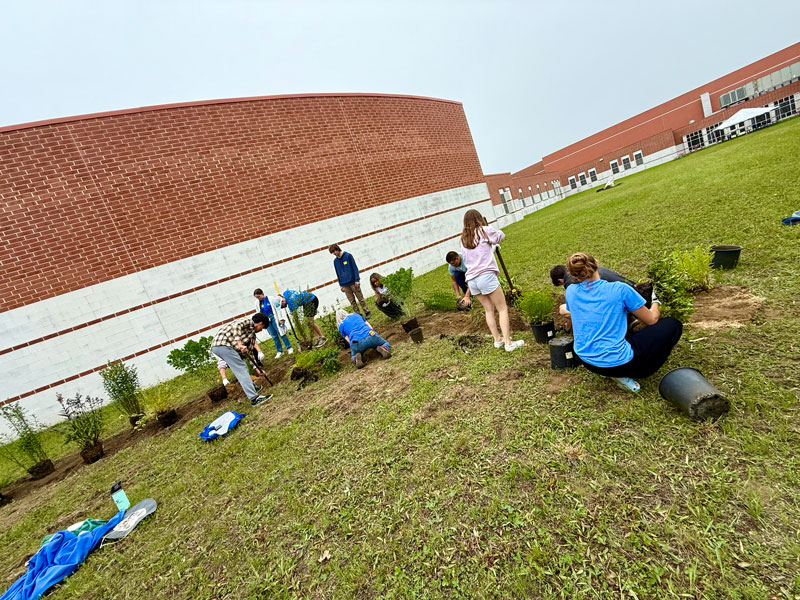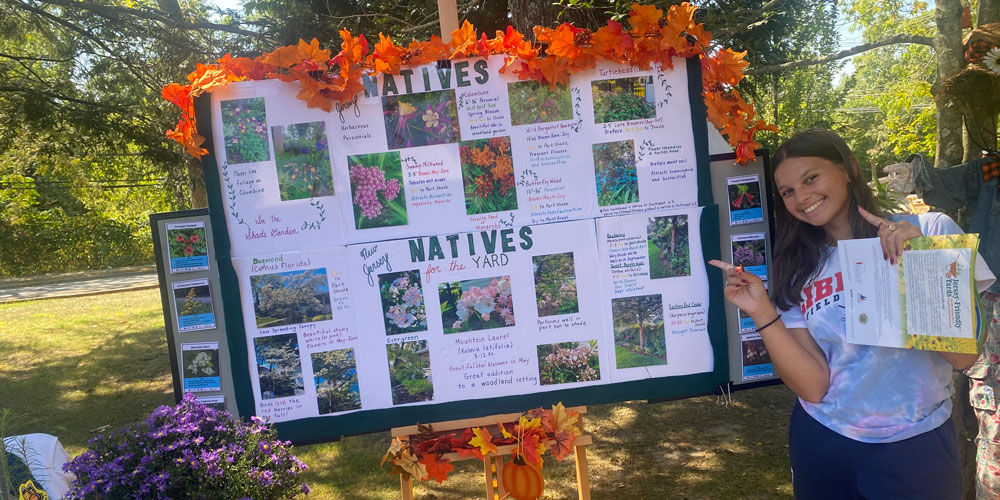This blog post was written by Ava Bocchiaro, a 2025-2026 EarthEcho Lead Water Challenge Ambassador and a 2024-2025 EarthEcho Water Challenge Ambassador.

The Jackson Liberty High School Environmental Club is proud to have created a native plant garden in the school’s courtyard—an initiative designed to serve as a living classroom for biology and environmental science students and for all students to enjoy. While the school district offers environmental science courses, our Environmental Club believes in the importance of learning about our environment and how to improve it firsthand, which ultimately was the inspiration for this project. This space will offer a hands-on learning experience about the importance of native plant species, their role in local ecosystems, the connection to the health of our water resources, and the basics of sustainable garden care. There is such an important connection between soil health and water quality and this is what motivated me to initiate this project! We were thrilled to complete the planting during the final week of school, thanks to the incredible support of the Jersey-Friendly Yards program team. Their generous donation covered the full cost of the plants, which were sourced from a local farm, and they also assisted with designing and planting the garden, and installing a timed irrigation system. In preparation, students completed the four steps to a Jersey-Friendly school yard which required that we conduct soil tests and research which native plants would thrive in our region’s sandy soil. Through this project, students gained valuable knowledge about native New Jersey flora, pollinator-friendly gardening practices, and environmental stewardship. Beyond serving as a dynamic educational resource, the garden will also help improve the soil quality on campus, and in turn, benefit the health of our local waterways. Often stressing the importance of native plants and their contribution to the health of water resources, this project closely aligns with EarthEcho International’s Water Challenge mission. This project was an unforgettable and impactful experience for everyone involved!
Project Details and Activities
In September of 2024, I attended the Rutgers Master Gardeners of Ocean County Fall Garden Days event where I met and talked with incredible experienced gardeners and professionals who shared projects they have done with local schools to utilize their greenhouses, to plant gardens, and to perform workshops. This event planted the seed in my mind to initiate some sort of garden project for my school.

A few Master Gardeners were kind enough to share their contact information so we could correspond further. I reached out to them and we set a date to meet, joined by my Environmental Club advisor (who is also our AP Environmental Science teacher). The meeting was amazing! I shared that I was hoping for a native pollinator garden, to which they said they only work with native plants. This was great to hear because only planting native is such a huge value of mine. We talked about everything from location within our school campus, to the shape of the garden, and the Master Gardeners helped us to think through every last detail. I had never gardened prior to this project, so professionals sharing their expertise was incredibly helpful.
After our meeting with Rutgers Master Gardeners, my advisor and I reached out to the Jersey-Friendly Yards program team for further opinions and assistance. Jersey-Friendly Yards (JFY) is a statewide initiative launched in 2014 by the Barnegat Bay Partnership through a grant by the NJDEP. Jersey-Friendly Yards addresses nonpoint source pollution in our waterways, with a specific focus on runoff coming from fertilizer waste on lawns. The JFY website provides resources to help residents, schools and municipalities create healthy landscapes for a healthy environment, learn about soil, water, fertilizer and pesticide use, create wildlife habitat and learn about the importance of native plants when planning a healthy landscape or garden. Jackson Liberty High School enrolled in the JFY School Certification program. With a pollinator garden in mind, we planned for JFY educators to visit Jackson Liberty High School several times during the school year to teach Environmental Club students how to plan, design and install our native garden.
We set a date for Jersey-Friendly Yards to give an initial presentation to our Environmental Club about the importance of native plants and their contributions to the environment. We had extremely high member participation for this presentation, with over fifty Environmental Club members in attendance! The presentation went extremely well, and we immediately set up a follow-up visit with Jersey-Friendly Yards Educators to test our school’s soil in the area we were planning to plant the garden. The soil testing day was so informative! As a result of soil testing, we were able to decide which native species would best thrive in our nutrient poor, slightly acidic, sandy soil. We then chose our plants from the JFY Going Native! brochure and the Jersey-Friendly Yards Plant Database. Jersey-Friendly Yards generously covered the cost of purchasing all of our plants from a local farm, Cicconi Farms, as well as a hose and timed irrigation system!

The only thing that was left to do was to plan and plant our garden! On the day before our planting day was scheduled, my advisor, a few students and I went out to the courtyard during the school day to plan the garden space, and begin digging and sifting soil for our garden. Thanks to everyone’s hard work, this only took a few hours and then we were finally ready to plant. Finally, planting day arrived! We carried in all of our plants that Jersey-Friendly Yards transported for us, and arranged them in the space so that plants that would grow taller were in the back, and smaller more bushy plants were in the front. Once we were happy with the set up, Jersey-Friendly Yards Educators gave us a quick planting tutorial and we began work. Thanks to amazing participation from our club, all of the planting was done in less than an hour. We were so happy with the results and this project will be even more gratifying when our plants are growing, thriving, and in bloom. I can’t wait to see how our garden develops and since I graduated this past June, this will definitely be a great excuse to visit my (now) old high school!
Link to Jersey-Friendly Yards Plant Database where we were able to search for our perfect plants: https://www.jerseyyards.org/plant/
Jackson Liberty High School is one of only a handful of schools working towards Jersey-Friendly Yards School Certification, which was the basis for our entire garden project! The Jersey-Friendly Yards program was conceived in 2012 and officially launched in 2014. It is the flagship program of the Barnegat Bay Partnership and partners include the Ocean County Soil Conservation District and Rutgers Cooperative Extension of Ocean County. Click on “schools” at https://www.jerseyyards.org/certification-program/ to learn more about this amazing program!
Impact and Metrics
- Students involved in the garden’s creation: 80+
- Total area covered by garden: 100 square feet
- Total species planted: 9
- Bearberry Arctostaphylos uva-ursi (Massachusets)
- Common Milkweed Asclepias incarnata
- Skyblue Aster (Aster azure)
- Aromatic aster Aster oblongifolius (Raydon’s Favorite)
- Blue False Indigo Baptisia australis (Grape Escape)
- Coreopsis “Lil Bang Candy Stripes”
- Coastal Panicgrass Panicum amarum
- Foxglove Beardtongue Penstemon digitalis (Husker Red)
- Wrinkleleaf Goldenrod Solidago rugosa (Fireworks)
- Professional gardeners involved: 7
- Professional organizations involved: 2
- Jackson Liberty High School staff members involved: 5
- Students that will get to enjoy our garden in the 2025-2026 school year: 2,400

Reflection and Learning
Anyone who has played sports at Jackson Liberty High School knows that the school is not exactly known for having rich soil! We have all seen the ball go rogue off of rocks at field hockey games, and have scraped our legs sliding at softball games. In fact, we affectionately refer to our field hockey field as the “dust bowl.” Our soil isn’t the kind of dark, soft soil most people might think of when deciding to plant a garden! It appears to be pretty much straight up sand and rocks but it just happens to be “sand” or “sandy loam,” based on the Soil Texture Triangle. This soil is very special because it is what makes our Pine Barrens and Pinelands area so unique. We learned that native plants that thrive in the Pine Barrens ecosystem, like many of the natives planted in our garden, actually depend on sandy soil!
We were quite unsure of how our plants would fare being planted in such non-nutrient dense conditions. However, the great thing about native plants is their ability to adapt and thrive in harsh conditions. Knowing that due to the sand, our soil has extremely high porosity and therefore does not hold water well, we would need to find native plants that need the least amount of water to survive. Given the fact that our garden would be in the courtyard, our selected plants would also be getting full sun for most of the day which we also had to take into consideration.
So, we learned that we needed plants that could survive with little water, full sun, and without a whole lot of nutrients. Asking for plants that meet this criteria seemed like a tall order, but native plants grow in all sorts of climates, so believe it or not, this was very doable!
After our plants were selected, our next order of business was to figure out how to keep this garden alive and help it to thrive. Our plants all came potted, so we took them out of their pots and softened up the soil and root systems a bit before planting them, original soil and all. Since the soil they were potted in was a lot more nutrient dense than our “sand,” keeping their original soil added a healthy amount of nutrients to kickstart their growth.
Next, water! We receive a very average amount of rain here in Jackson, NJ, and with our high porosity soil (which has low water-holding capability), we learned we would have to rely on more than just the occasional rain and periodic watering. The reality was that students would not be in the building during summer, so we could not operate on a club member-dependent watering schedule. Jersey-Friendly Yards was generous enough to provide us with a timed irrigation system, which made all the difference! We still enlisted our school grounds crew to keep an eye on the garden during the summer, but having the irrigation system has proven to be critically important.
Not many of our students were experienced gardeners, so when the time came to actually arrange and plant our garden, Jersey-Friendly Yards Educators were a huge help. We worked through several challenges, and I am so proud of our Environmental Club for taking these difficulties in stride and persevering, thinking on the fly, and getting creative. We all learned so much from this project, not only about the fundamental importance of native plants, but also about following through on a plan, learning to delegate, and not being afraid to ask questions and to decide you want to make a difference, even if it is outside of your knowledge base. I am so happy with how our garden turned out and that I was able to be a part of a project to benefit both my community and ecosystem!
Next Steps
One of the most exciting parts of this project is all the possibilities now that it is finished. Environmental Club student members can create plant labels for each species that include a photo of our plant and a brief description that can be pulled from the Jersey-Friendly Yards Plant Database website. They can also add a QR code to the plant signs that links to each plant's webpage on the website. This way, when students and other visitors are out enjoying the garden, they can read a little bit about each plant and use the QR code to get more detailed information. The Environmental Club, biology and science classes, and Science National Honor Society can use the garden as a living classroom to inspire students and teach aspiring gardeners the ins and outs of maintaining a garden, and of course highlighting the importance of native plants!
In Conclusion
Our environment has been my passion since I was tiny and I am working toward a future career path that includes hydrology/hydrogeology and environmental geoscience. The “living classroom” concept is an incredible way to learn, and projects like this one combine my love of science with my love of community, and give me an avenue to help bring about change. Please connect with me on LinkedIn (Ava Bocchiaro) and follow my instagram @_earth.2.ava_ for my latest projects and earthly adventures!

